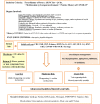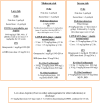The "Golden Hours" Algorithm For the Management of the Multisystem Inflammatory Syndrome in Children (MIS-C)
- PMID: 33614843
- PMCID: PMC7868488
- DOI: 10.1177/2333794X21990339
The "Golden Hours" Algorithm For the Management of the Multisystem Inflammatory Syndrome in Children (MIS-C)
Abstract
The global concern of increasing number of children presenting with multisystem inflammatory syndrome in children (MIS-C) related to the coronavirus disease (COVID-19) has escalated the need for a case-oriented clinical approach that provides timely diagnosis and management. The aim of this study is to share our experience in managing 64 MIS-C patients of North African ethnicity guided by a risk-based algorithm. Sixty-four patients met the inclusion criteria, 19 (30%) patients were categorized as mild and moderate risk groups and cared for in an isolation ward and 45 patients who belonged to the high-risk group (70%) were admitted to the pediatric intensive care unit (PICU). Positive laboratory evidence of COVID-19 was found in 62 patients. Fever and dysfunction in 2 or more organs were confirmed in all cases (100%). Fifty patients (78%) presented with gastrointestinal symptoms, meanwhile only 10 patients (16%) had respiratory manifestations. Cardiac involvement was reported in 55 (86%) cases; hypotension and shock were found in 45 patients (70%) therein circulatory support and mechanical ventilations were needed for 45 and 13 patients respectively. Intravenous immunoglobulins (IVIG) were used for all cases and methylprednisolone was used in 60 patients (94%). Fifty-eight (91%) patients were discharged home after an average of 9 days of hospitalization. The mortality rate was 9% (6 patients). Conclusion. A single Egyptian center experience in the management of MIS-C patients guided by a proposed bed side algorithm is described. The algorithm proved to be a helpful tool for first-line responders, and helped initiate early treatment with IVIG.
Keywords: COVID-19; IVIG; Kawasaki disease; algorithm; pediatric MIS-C.
© The Author(s) 2021.
Conflict of interest statement
Declaration of Conflicting Interests: The authors declared no potential conflicts of interest with respect to the research, authorship, and/or publication of this article.
Figures
Similar articles
-
Severe manifestations of SARS-CoV-2 in children and adolescents: from COVID-19 pneumonia to multisystem inflammatory syndrome: a multicentre study in pediatric intensive care units in Spain.Crit Care. 2020 Nov 26;24(1):666. doi: 10.1186/s13054-020-03332-4. Crit Care. 2020. PMID: 33243303 Free PMC article.
-
A retrospective comparative analysis of factors affecting the decision and outcome of initial intravenous immunoglobulin alone or intravenous immunoglobulin plus methylprednisolone use in children with the multisystem inflammatory syndrome.Pediatr Rheumatol Online J. 2022 Aug 20;20(1):69. doi: 10.1186/s12969-022-00726-2. Pediatr Rheumatol Online J. 2022. PMID: 35987681 Free PMC article. Clinical Trial.
-
A case report on multisystem inflammatory syndrome in children (MIS-C) associated with COVID-19 infection.Clin Case Rep. 2024 Apr 3;12(4):e8737. doi: 10.1002/ccr3.8737. eCollection 2024 Apr. Clin Case Rep. 2024. PMID: 38571905 Free PMC article.
-
COVID-19 Associated Multisystem Inflammatory Syndrome: A Systematic Review and Meta-analysis.Iran J Allergy Asthma Immunol. 2020 Dec 19;19(6):570-588. doi: 10.18502/ijaai.v19i6.4927. Iran J Allergy Asthma Immunol. 2020. PMID: 33463127
-
Kawasaki Disease and COVID-19.Mediterr J Rheumatol. 2020 Sep 21;31(Suppl 2):268-274. doi: 10.31138/mjr.31.3.268. eCollection 2020 Sep. Mediterr J Rheumatol. 2020. PMID: 33196004 Free PMC article. Review.
Cited by
-
Clinical Characteristics and Pulmonary Computerized Imaging Findings of Critically Ill Egyptian Patients with Multisystem Inflammatory Syndrome in Children.Glob Pediatr Health. 2022 Apr 7;9:2333794X221085386. doi: 10.1177/2333794X221085386. eCollection 2022. Glob Pediatr Health. 2022. PMID: 35425848 Free PMC article.
-
Ten-month follow-up of patients with covid-19 temporally related multi-system inflammatory syndrome in children: the experience of the children hospital of Palermo.Ital J Pediatr. 2023 Mar 23;49(1):37. doi: 10.1186/s13052-023-01416-9. Ital J Pediatr. 2023. PMID: 36959663 Free PMC article.
-
Development of a biomarker signature using grating-coupled fluorescence plasmonic microarray for diagnosis of MIS-C.Front Bioeng Biotechnol. 2023 Mar 31;11:1066391. doi: 10.3389/fbioe.2023.1066391. eCollection 2023. Front Bioeng Biotechnol. 2023. PMID: 37064248 Free PMC article.
-
Short-term Cardiovascular Complications of Multi-system Inflammatory Syndrome in Children (MIS-C) in Adolescents and Children.Curr Pediatr Rep. 2021;9(4):93-103. doi: 10.1007/s40124-021-00258-5. Epub 2021 Oct 22. Curr Pediatr Rep. 2021. PMID: 34703656 Free PMC article. Review.
-
The evaluation of the burden of multisystem inflammatory syndrome in children on health economics.Arch Rheumatol. 2023 Jun 14;39(1):10-19. doi: 10.46497/ArchRheumatol.2023.10147. eCollection 2024 Mar. Arch Rheumatol. 2023. PMID: 38774689 Free PMC article.
References
-
- Centers for Disease Control and Prevention Health Alert Network (HAN). Multisystem Inflammatory Syndrome in Children (MIS-C) Associated with Coronavirus Disease 2019 (COVID-19). Accessed July 9, 2020 https://emergency.cdc.gov/han/2020/han00432.asp
-
- McCrindle BW, Rowley AH, Newburger JW, et al.; American Heart Association Rheumatic Fever, Endocarditis, and Kawasaki Disease Committee of the Council on Cardiovascular Disease in the Young; Council on Cardiovascular and Stroke Nursing; Council on Cardiovascular Surgery and Anesthesia; and Council on Epidemiology and Prevention. Diagnosis, treatment, and long-term management of Kawasaki disease: a scientific statement for health professionals from the American Heart Association. Circulation. 2017;135:e927-e999. - PubMed
LinkOut - more resources
Full Text Sources
Other Literature Sources
Miscellaneous



